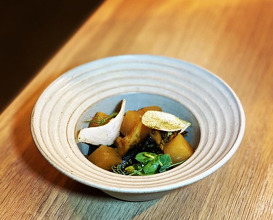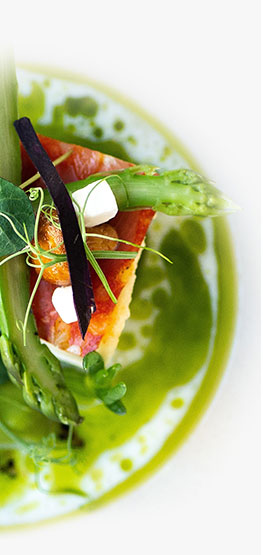5) Koji Marinated Kohlrabi – foraged mushrooms, cauliflower chervil 😋
~
Most restaurants open with a vision of what they want to be and what might be achievable over time. A few manage to stay committed to lofty ideals despite operational challenges that inevitably arise. The general problems of the industry have been well documented: staffing shortages, inconsistent supply-chain availability, and rising food and labor costs. No restaurant is perfect in navigating these issues, and none should be expected to get it right every time ✋
Oyster Oyster, however, comes exceedingly close without wavering from its unrelenting pursuit of plant-forward cuisine. From eschewing single-use plastic wrap to upcycling wine bottles into new plateware, it has become an exemplar in minimizing waste while adopting and maintaining sustainable practices, one step at a time. The restaurant’s ethos is hard to miss. A sign hangs outside this Shaw establishment featuring the pairing of an oyster mushroom with the oyster bivalve. Eating here, one learns about the foraged and home-grown fungi featured in the courses and that oysters—optional by the way—filter and clean the waters in which they reside. Talk about environmental matrimony 🍄🦪
But there’s no air of moral superiority in their work. Oyster Oyster is just purpose driven in cultivating the gastronomy of local and seasonal food using vegetables, plants, and mushrooms. The result happens to be delicious and thoughtful nourishment for both body and mind. From opening to now almost four years later, and without the need to shout or evangelize, Oyster Oyster has demonstrated the tangible steps it takes to be better stewards of the planet 🌱
Change is often thought of as some sudden and forceful event that arrives like a thunderbolt. But more likely, it’s the culmination of many small measures implemented over time. In this particular case, change is coming from the deliberate acts of one conscientious and transformative restaurant in Washington, DC 👏
~
@michelinguide for 2023: 🌟



